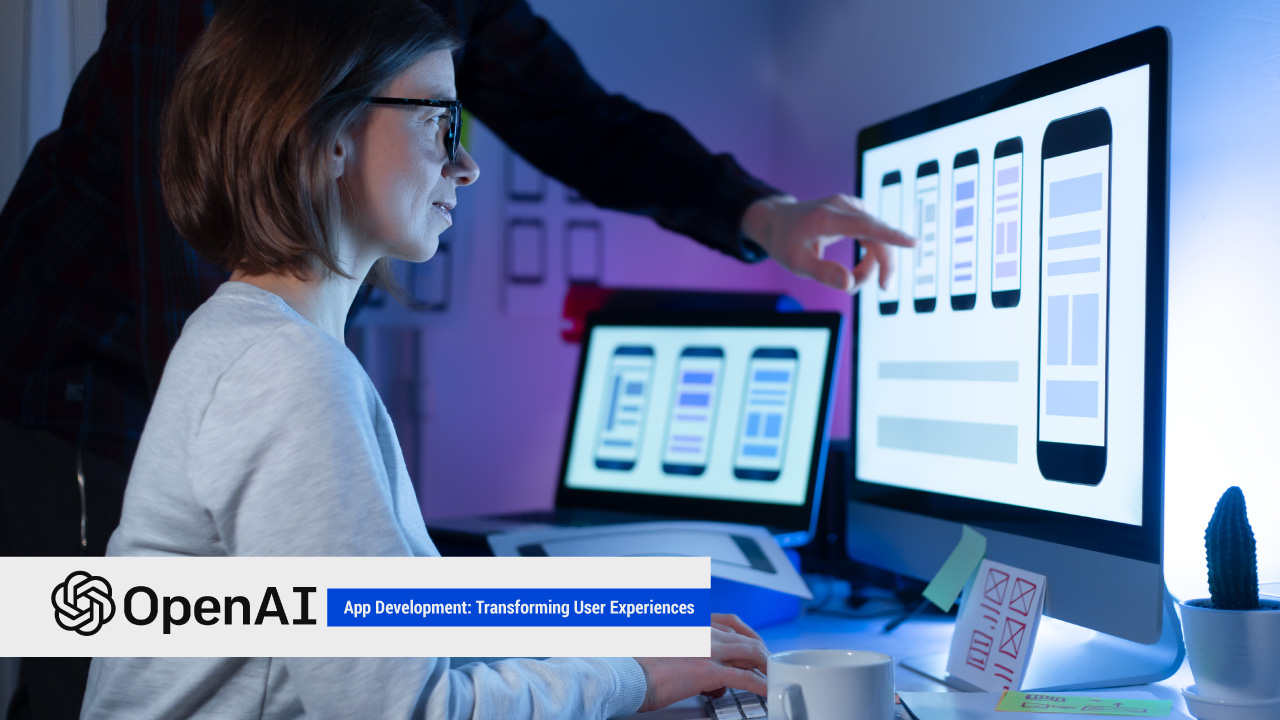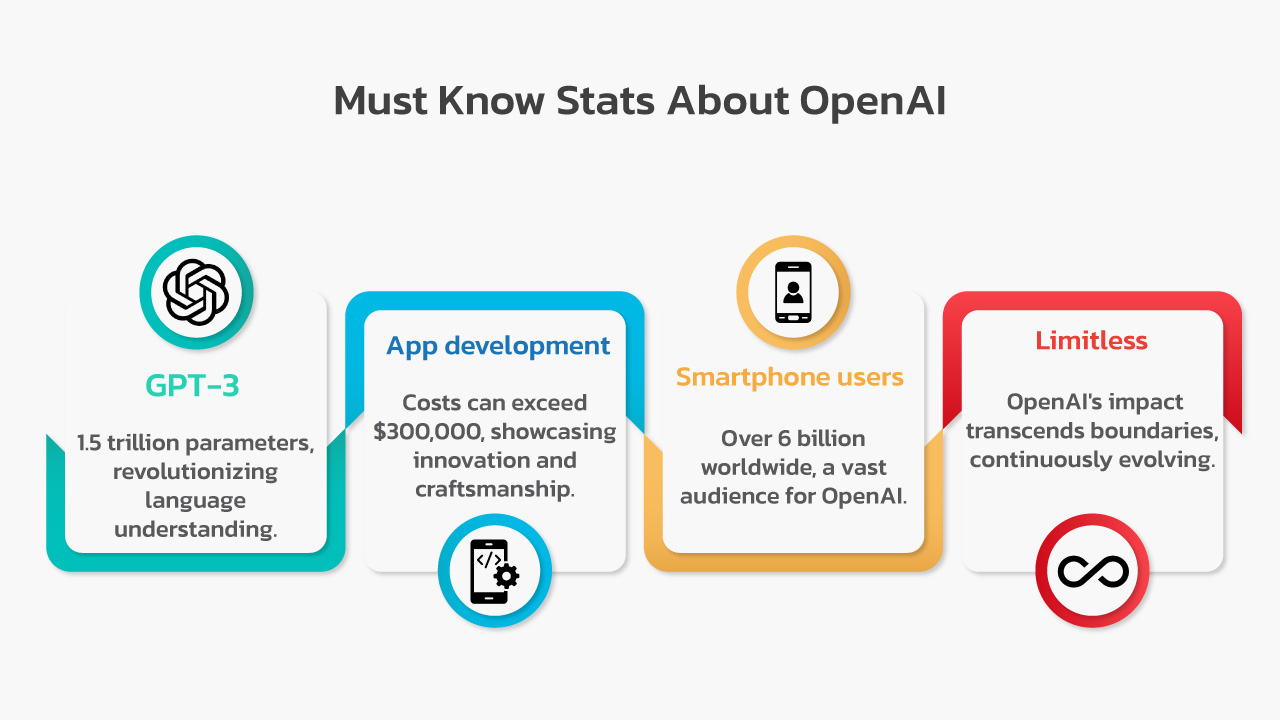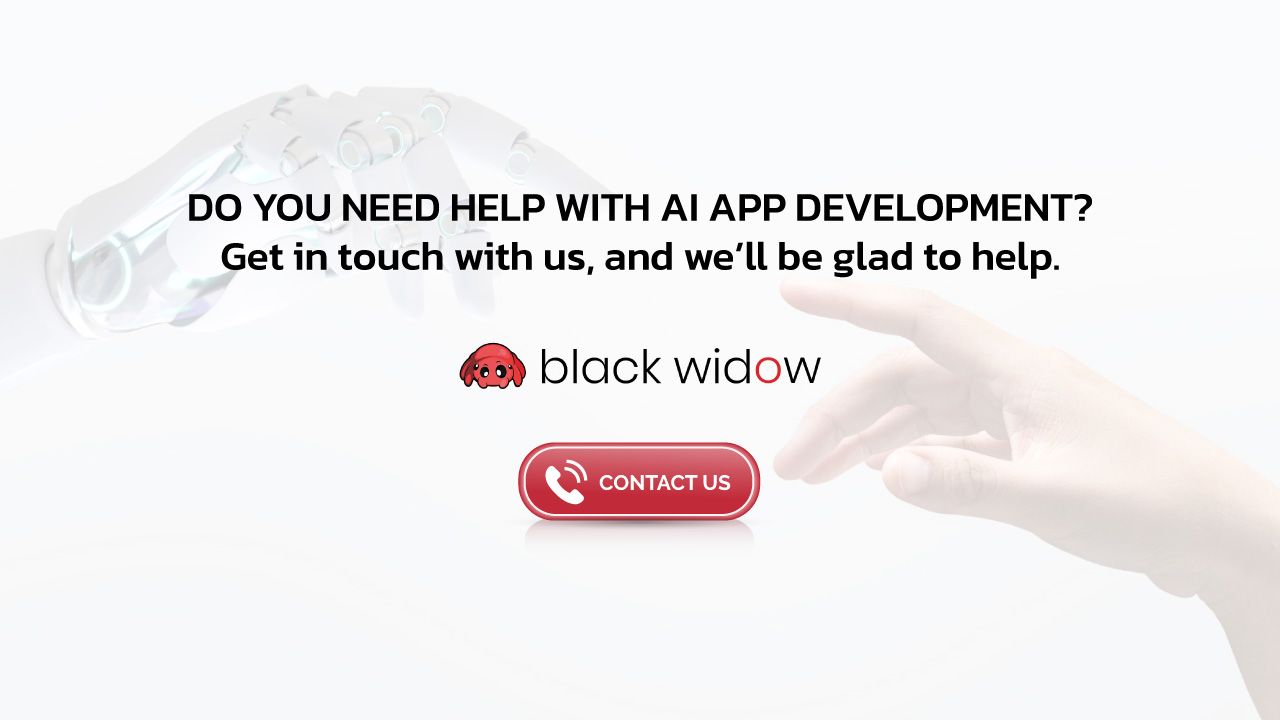OpenAI-Powered App Development: Transforming User Experiences

In our digitally interconnected era, where over 6.6 billion individuals wield the power of smartphones, mobile apps have emerged as an omnipresent force, shaping our daily lives. These ingenious creations have become the cornerstone of modern society, generating substantial revenue and captivating users worldwide. Now, imagine being a part of this transformative wave – an opportunity you simply cannot afford to overlook!
Nevertheless, before embarking on your extraordinary app journey, it is crucial to unravel the enigma of app development costs. It is only natural that when clients, brimming with brilliant app ideas, approach us, they eagerly inquire about the financial investment required to bring their vision to life.
The cost of crafting a mesmerizing mobile app is a blend of art and science. With a range that typically spans from $40,000 to $150,000, the financial landscape of app development may surprise you. But hold on tight, for in certain instances, the cost can soar beyond imagination, surpassing even the $300,000 mark!
But what if you could develop an app by yourself- without having to cost an arm and a leg? All you need is to log in to a tool that chats like a buddy and enlightens you about everything- even above the sky!
HOW? BUILD AN APP WITH OPEN AI
Introduction to Open AI
In the realm of boundless innovation and endless imagination exists a remarkable entity known as Open AI. Like a dazzling star amidst the intellectual cosmos, Open AI illuminates the path to a future brimming with possibilities.
Picture a realm where machines possess the power to comprehend and communicate in the rich tapestry of human language. Open AI, a majestic amalgamation of cutting-edge technology and extraordinary minds, has unlocked the enigma of artificial intelligence, forever transforming the way we perceive and interact with the world.
Within the depths of its digital expanse, Open AI’s vast neural network dances with knowledge and insight, nurtured by the collective wisdom of generations past. It embodies the essence of curiosity, tirelessly learning and evolving, transcending the boundaries of conventional thought.
Open AI’s wondrous creations captivate our senses, effortlessly crafting prose and poetry and even conversing like a cherished companion. It extends its benevolent hand to empower industries, enriching the realms of healthcare, finance, and beyond with its unrivaled intellect.
Yet, Open AI is more than mere intelligence. It is an ardent advocate of collaboration and inclusivity, inviting the world to join its quest for progress. Like an open door to the realm of boundless ideas, it embraces the collective brilliance of humanity, fostering a community that thrives on innovation and mutual growth.

How Does OpenAI Help to Develop a Mobile App?
OpenAI APIs, or Application Programming Interfaces, are tools provided by OpenAI that enable developers to integrate artificial intelligence capabilities into their mobile apps. These APIs offer a range of functionalities that can enhance the app’s features and user experiences.
Here’s a breakdown of how OpenAI APIs can benefit mobile app development:
- Natural Language Processing: OpenAI’s NLP models, like GPT-3, can understand and generate human-like text. With these models, developers can implement chatbots, virtual assistants, language translation, content generation, and more within their mobile apps.
- Smart Recommendations: OpenAI’s recommendation models help in personalized and intelligent recommendations to app users. Whether it’s suggesting products, articles, or services based on user preferences and behavior, these models enhance user engagement and satisfaction.
- Image and Video Analysis: OpenAI’s computer vision models enable apps to analyze and comprehend visual content. Developers can leverage these models for tasks such as image recognition, object detection, video summarization, and other visual-related functionalities in their mobile apps.
- Creative Content Generation: OpenAI’s models can generate unique creative content, such as stories, poetry, and narratives. Integrating these models into an app allows for dynamic and imaginative content generation, enhancing the overall user experience.
- Language Translation: OpenAI’s language models excel in translation tasks. By utilizing these models, developers can implement multilingual features within their mobile apps, breaking down language barriers and facilitating effective communication among users.
- Customization and Integration: OpenAI APIs provide developers with the flexibility to customize and integrate AI capabilities to suit their app’s specific requirements. It allows developers to leverage the power of OpenAI’s models while maintaining the app’s unique identity and functionality.
By incorporating OpenAI APIs into mobile app development, developers can harness the capabilities of artificial intelligence to improve user experiences, automate tasks, and provide innovative features. OpenAI becomes a valuable partner in creating intelligent and remarkable mobile apps.
How to Implement AI in Mobile Apps?
- Define Use Case: Start by defining the use case for AI in your mobile app. Identify the specific problem or functionality you want to address using AI capabilities. It could be anything from natural language processing, computer vision, recommendation systems, or chatbot functionalities.
- Data Collection: Gather relevant data required to train and evaluate your AI models. The quality and quantity of data are crucial for successful AI implementation. Depending on your use case, you may need labeled datasets, user interactions, images, audio, or any other form of data. Ensure that the data is diverse and covers a range of scenarios to achieve accurate and unbiased results.
- Model Selection or Development: Choose the appropriate AI model for your use case. You can leverage pre-trained models available in popular frameworks like TensorFlow, PyTorch, or Keras. Alternatively, if no suitable pre-trained models exist, you may need to develop a custom model. It involves designing the architecture, selecting appropriate algorithms, and training the model using your collected data.
- Training: Train the selected or custom AI model using the collected data. This process involves feeding the model with input data and corresponding output labels (in supervised learning scenarios) or allowing the model to learn patterns and representations from the data (in unsupervised or reinforcement learning scenarios). Training typically involves optimizing the model’s parameters through iterative processes like gradient descent.
- Integration: Integrate the trained AI model into your mobile app. Most mobile platforms provide AI frameworks and libraries that simplify the integration process. For instance, on Android, you can use TensorFlow Lite or ML Kit, while on iOS, you can use Core ML. These frameworks allow you to load the model, make predictions, and handle the AI-related functionalities within your app’s codebase.
- Mobile App Development: Develop the user interface and backend components of your mobile app to support the AI functionality. Design the screens, implement user interactions, and integrate the AI model’s predictions or responses into the app’s logic. Ensure that the app’s architecture is designed to handle the AI computations efficiently and provide a seamless user experience.
- Testing and Evaluation: Conduct thorough testing of the AI integration in your mobile app. Perform functional testing to ensure the AI features work as intended and do not introduce any regressions. Additionally, evaluate the performance of the AI model in terms of accuracy, latency, and resource consumption. User acceptance testing can gather feedback and identify areas for improvement to enhance the overall user experience.
- Deployment and Iteration: Once the AI-integrated mobile app is tested and validated, deploy it to the relevant app stores or distribution channels. Monitor the app’s performance and gather user feedback to identify areas for further iteration. This feedback loop allows you to refine the AI models, improve the data collection processes, and enhance the app’s functionality based on real-world usage.
Which Industries Will Benefit from AI Mobile App Development?
- Healthcare: AI in mobile apps can improve diagnostics, telemedicine, and medication management.
- E-commerce and Retail: AI can personalize product recommendations and optimize inventory management.
- Finance and Banking: AI enhances financial management, fraud detection, and customer support.
- Travel and Hospitality: AI offers personalized travel recommendations and chat-based concierge services.
- Transportation and Logistics: AI optimizes route planning, real-time tracking, and supply chain management.
- Education and E-Learning: AI provides personalized learning paths and intelligent tutoring systems.
- Entertainment and Media: AI enables personalized content recommendations and chatbot engagement.
- Real Estate: AI offers virtual property tours and intelligent property recommendations.
In conclusion, partnering with Black Widow Tech, a leading app development company, can greatly benefit your journey in building an AI-powered mobile app or integrating AI capabilities into your existing app model. With their expertise and experience, they possess the necessary skills to harness the potential of AI and create innovative, intelligent solutions that cater to your specific needs.
By leveraging the power of AI, your mobile app can deliver personalized experiences, automate tasks, improve efficiency, and provide valuable insights to users. Whether it’s implementing natural language processing, computer vision, recommendation systems, or chatbot functionalities, Black Widow Tech will work closely with you to ensure that the AI integration aligns with your app’s vision and goals.
Moreover, Black Widow Tech’s commitment to quality and innovation ensures that your AI-powered mobile app will be equipped with cutting-edge technologies and industry best practices. They will conduct thorough testing and evaluation to ensure the reliability, accuracy, and performance of the AI components.
By choosing Black Widow Tech as your mobile app development partner, you gain access to their in-depth knowledge of AI, their dedication to delivering exceptional solutions, and their focus on providing a seamless user experience. Together, you can bring your AI-driven mobile app ideas to life and stay ahead of the competition in the dynamic world of technology.
Embark on your AI app development journey with Black Widow Tech and unlock the potential of artificial intelligence to revolutionize your mobile app and meet the evolving needs of your users.

